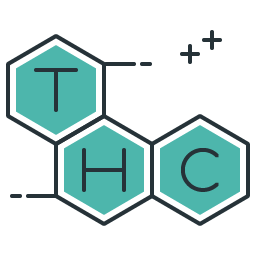Let’s break down THC and CBD, their effects, side effects and practical applications

As medical marijuana is legalized in an increasing number of countries around the world, major developments have been made in discovering the medicinal and therapeutic value in the marijuana plant. Understandably, the idea of full legalization is still met with plenty of pushback from opposition groups. In America, for example, while medical and recreational consumption of marijuana is now allowed in a number of states, it is still technically illegal at the federal level.

As the debate for full legalization rages on, it has never been more important to distinguish the key compounds tetrahydrocannabinol (THC) from cannabidiol (CBD) in terms of their respective properties. In this post, we go over the distinctions between the two – from recreational value to the medically indispensable aspects that animate so much of the activism from marijuana advocates.
What is THC & How Does It Work?

THC is the psychoactive compound in marijuana and, as such, is the primary source of the controversy surrounding marijuana legislation. THC has been shown to ameliorate symptoms of asthma, nausea, insomnia, chronic pain and even anorexia. It is often prescribed as a muscle relaxant and analgesic. Still, families, employers and legislators assert that individuals with an altered state of consciousness can be a public safety risk on the road, in the workplace and elsewhere.
THC works by stimulating cells in the brain to produce dopamine while simultaneously activating our cannabinoid receptors. This quickly produces a mellow, relaxing effect followed by an onset of secondary effects depending on the strain consumed. The most commonly reported secondary effects of THC are feelings of euphoria, an altered perception of time and significantly increased appetite.
THC is available mainly in five forms, namely in syrups, tinctures, topicals (such as balms and lotions), medicine and weed drops. Because of its psychoactive properties, THC is really only available to prescription or medical card holders and patients in countries where medical marijuana is legal.
What is CBD & How Is It Different From THC?

Of the five hundred compounds present in the marijuana plant, over a hundred of them are cannabinoids. When properly administered, they can imitate naturally-occurring endocannabinoids in our bodies, which are the compounds responsible for maintaining our health and wellness. CBD has no psychoactive properties, and is used as an anti-spasmodic, anti-inflammatory, anti-psychotic and anti-tumoral to treat a wide range of medical conditions. CBD has even been used to relieve symptoms of arthritis and cardiovascular diseases in cats and dogs.
CBD is shown to have tremendous synergy with terpenoids in the form of terpenes incorporated in isolates and other CBD products. When used in conjunction, they are used to help treat a variety of symptoms and illnesses including:

- Cancer
- Epilepsy
- Multiple Sclerosis
- Gout
- Arthritis
- Migraines
- Inflammation
- Schizophrenia
- Depression
- Anxiety
- Stress Disorders
CBD is also used to provide relief from side effects of cancer treatment, and (with continuing medical research) is increasingly recognised to be indispensable in terms of medicinal and therapeutic value.
Unlike THC, CBD has been promulgated by marijuana advocates and medical experts alike. Its lack of psychoactive properties as well as news stories around the world documenting the use of CBD to cure seizures in children cause CBD to be viewed by the public in a much more favourable light. Because of this, CBD is available in a considerably broader range of products compared to THC.
It is available in medicine, skin care products, tinctures, vape oils, pet treats and even beauty products like makeup and cannabis perfume. Experimental bars and restaurants are opening up in cities like Amsterdam and Los Angeles with CBD and terpenes heavily incorporated into their entrées, desserts and alcoholic beverages. Given its well-deserved reputation as the wonder compound of whole plant medicine, CBD products are legal for anyone of legal age in countries where medical or recreational marijuana is legal.
Informed Advocacy is Healthy Advocacy
While THC is shown to help treat neurodegenerative diseases such as Parkinson’s and Alzheimer’s, it is unlikely to win the public over anytime soon the way CBD has. Still, the medicinal and therapeutic value of the marijuana plant cannot be ignored. With continuing research, perhaps a middle ground can be reached between advocates and lawmakers – allowing us to harness the curative qualities of natural medicine while minimizing any risk to public safety.
